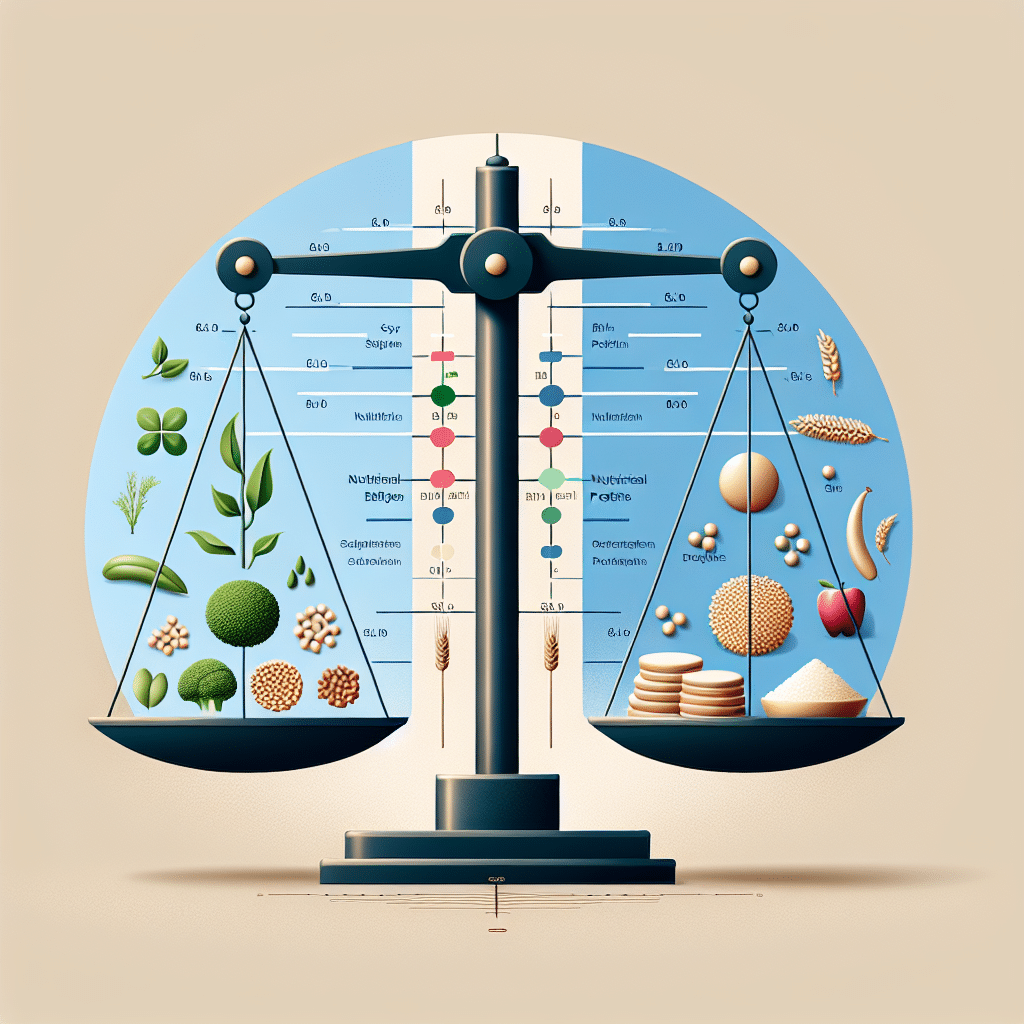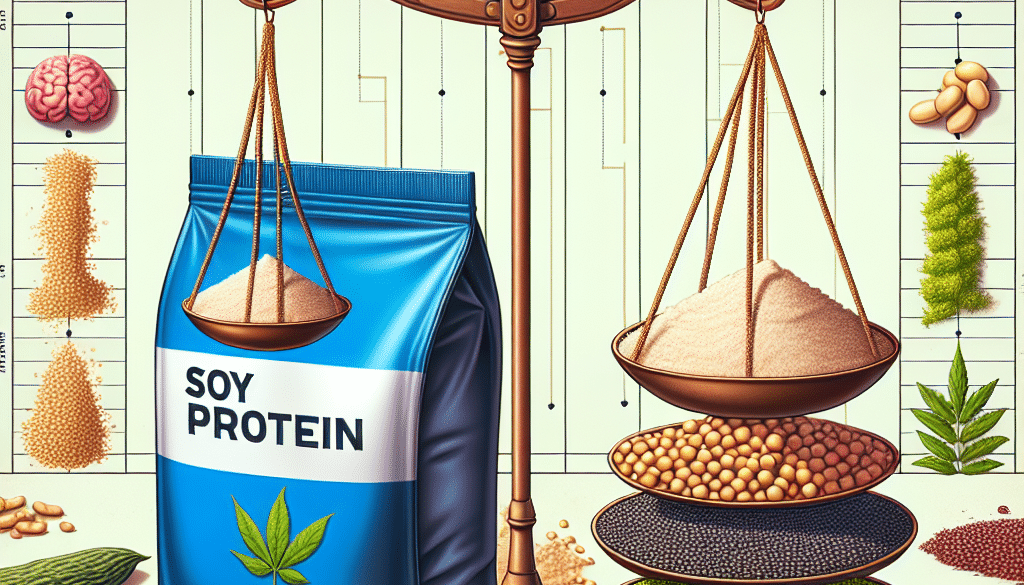Is Soy Protein Better Than Plant Protein?
-
Table of Contents
- Soy Protein vs. Plant Protein: Which Reigns Supreme?
- Understanding Protein Quality
- The Nutritional Profile of Soy Protein
- Comparing Soy Protein to Other Plant Proteins
- Health Benefits and Concerns
- Soy Protein Benefits
- Concerns About Soy
- Benefits of Other Plant Proteins
- Considerations for Other Plant Proteins
- Environmental Impact
- Case Studies and Statistics
- Conclusion: Weighing Your Options
- Discover ETprotein’s Premium Protein Products
Soy Protein vs. Plant Protein: Which Reigns Supreme?

When it comes to protein sources, the debate between soy protein and other plant proteins is a hot topic among health enthusiasts, athletes, and those following plant-based diets. With the rise of veganism and vegetarianism, as well as an increased focus on health and sustainability, understanding the differences between these protein sources is more important than ever. This article delves into the nutritional profiles, health benefits, and potential drawbacks of soy protein compared to other plant-based proteins.
Understanding Protein Quality
Before comparing soy protein to other plant proteins, it’s essential to understand what makes a protein source ‘high quality.’ Protein quality is determined by its amino acid profile and digestibility. A complete protein contains all nine essential amino acids in sufficient amounts. These amino acids are termed ‘essential’ because the body cannot synthesize them and must obtain them from food.
The Nutritional Profile of Soy Protein
Soy protein is derived from soybeans and is considered a complete protein, containing all nine essential amino acids. It’s also rich in vitamins and minerals, including B vitamins, iron, calcium, and magnesium. Soy protein is available in various forms, such as soy protein isolate, soy protein concentrate, and textured soy protein.
- Soy Protein Isolate: This is the most refined form of soy protein, containing about 90% protein. It’s low in fat and carbohydrates and is often used in protein powders and supplements.
- Soy Protein Concentrate: Containing about 70% protein, this form retains more of the natural fibers found in soybeans.
- Textured Soy Protein: Often used as a meat substitute, it has a texture similar to ground meat and is a versatile ingredient in many recipes.
Comparing Soy Protein to Other Plant Proteins
Other popular plant proteins include pea protein, rice protein, hemp protein, and proteins derived from seeds like pumpkin, sunflower, and chia. While these sources are rich in protein, they often lack one or more essential amino acids, making them incomplete proteins. However, combining different plant proteins can create a complete amino acid profile.
- Pea Protein: High in branched-chain amino acids, particularly arginine, which is beneficial for heart and muscle health.
- Rice Protein: Good for those with allergies to soy or peas, but low in lysine.
- Hemp Protein: Contains omega-3 and omega-6 fatty acids but is lower in lysine and leucine.
- Seed Proteins: Often high in fiber and healthy fats, but may lack certain essential amino acids.
Health Benefits and Concerns
Both soy protein and other plant proteins offer health benefits, including lower risks of heart disease, improved cholesterol levels, and a reduced carbon footprint compared to animal proteins. However, there are some concerns to consider.
Soy Protein Benefits
Soy protein has been shown to reduce LDL (bad) cholesterol and may have a positive effect on bone health. It also contains isoflavones, which have antioxidant properties and may reduce the risk of certain cancers.
Concerns About Soy
Some worry about the phytoestrogens in soy, which can mimic estrogen in the body. However, research indicates that moderate consumption of soy does not have adverse effects on hormone levels and may even be protective against breast cancer.
Benefits of Other Plant Proteins
Other plant proteins can offer a broader range of nutrients due to their varied sources. For example, hemp protein provides essential fatty acids, while pea protein is rich in iron.
Considerations for Other Plant Proteins
The main concern with other plant proteins is ensuring a complete amino acid profile. This can be achieved by consuming a variety of protein sources throughout the day.
Environmental Impact
Both soy protein and other plant proteins have a lower environmental impact than animal-based proteins. They require less water, land, and energy to produce and generate fewer greenhouse gas emissions. However, it’s important to consider the source of the soy or plant proteins, as some farming practices can lead to deforestation and habitat loss.
Case Studies and Statistics
Several studies have compared the effects of soy protein and other plant proteins on health. For example, a study published in the American Journal of Clinical Nutrition found that soy protein was effective in lowering total cholesterol and LDL cholesterol levels. Another study in the Journal of Nutrition showed that pea protein was just as effective as whey protein in promoting muscle thickness gains in athletes.
Conclusion: Weighing Your Options
In conclusion, soy protein stands out as a complete protein with a robust nutritional profile and health benefits. However, other plant proteins also offer unique advantages and can be part of a balanced diet when consumed in combination. Personal dietary needs, preferences, and environmental considerations will guide the choice between soy protein and other plant proteins.
Discover ETprotein’s Premium Protein Products
If you’re looking for high-quality plant-based proteins, ETprotein offers a range of products to meet your needs. Their organic rice protein, pea protein, and various seed proteins are characterized by a neutral taste, non-GMO, and allergen-free attributes. With purity levels exceeding industry standards, ETprotein caters to a diverse range of industries, ensuring that you receive only the best for your health and wellness journey.
About ETprotein:
ETprotein, a reputable protein and L-(+)-Ergothioneine (EGT) Chinese factory manufacturer and supplier, is renowned for producing, stocking, exporting, and delivering the highest quality organic bulk vegan proteins and L-(+)-Ergothioneine. They include Organic rice protein, clear rice protein, pea protein, clear pea protein, watermelon seed protein, pumpkin seed protein, sunflower seed protein, mung bean protein, peanut protein, and L-(+)-Ergothioneine EGT Pharmaceutical grade, L-(+)-Ergothioneine EGT food grade, L-(+)-Ergothioneine EGT cosmetic grade, L-(+)-Ergothioneine EGT reference grade and L-(+)-Ergothioneine EGT standard. Their offerings, characterized by a neutral taste, non-GMO, allergen-free attributes, with L-(+)-Ergothioneine purity over 98%, 99%, cater to a diverse range of industries. They serve nutraceutical, pharmaceutical, cosmeceutical, veterinary, as well as food and beverage finished product distributors, traders, and manufacturers across Europe, USA, Canada, Australia, Thailand, Japan, Korea, Brazil, and Chile, among others.
ETprotein specialization includes exporting and delivering tailor-made protein powder and finished nutritional supplements. Their extensive product range covers sectors like Food and Beverage, Sports Nutrition, Weight Management, Dietary Supplements, Health and Wellness Products, and Infant Formula, ensuring comprehensive solutions to meet all your protein needs.
As a trusted company by leading global food and beverage brands and Fortune 500 companies, ETprotein reinforces China’s reputation in the global arena. For more information or to sample their products, please contact them and email sales(at)ETprotein.com today.












